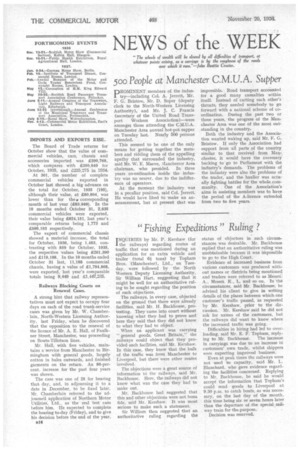"Fishing Expeditions" Ruling ?
Page 30

If you've noticed an error in this article please click here to report it so we can fix it.
INQUIRIES• by Mr. P. Kershaw (for the railways) regarding routes of traffic that was mentioned during an application for an extra vehicle and trailer (total 6f tons) by Topham Bros. '(Manchester), Ltd., on Tuesday, were followed by the North Western Deputy Licensing Authority, Sir William Hart, suggesting that it might be well for an authoritative ruling to be sought regarding the position of such objections.
The railways, in every case, objected on the ground that there were already facilities, said Mr. H. Backhouse, protesting. They came into court without knowing what they had to prove and here they said that they did not know to what they had to object.
When an applicant was carrying " general goods, Great Britain," the railways could object that they provided such facilities, said Mr. Kershaw. In this case, they knew that the bulk of the traffic was from Manchester to Liverpool, but there were other routes involved.
The objections were a great source of information to the railways, said Mr. Backhouse. Here, the railways did not know what was the case they had to make out.
Mr. Backhouse had suggested that this and other objections were not bona fide, said Mr. Kershaw. It was most serious to make such a statement.
Sir William then suggested that an authoritative ruling regarding the status of objectors in such circumstances was desirable. Mr. Backhouse replied that an authoritative ruling was unobtainable because it was impossible to go to the High Court.
Evidence of increased business from various customers was produced without names or districts being mentioned and traders were referred to as Messrs. A., MessrS. K., L. and so on. In the circumstances, said Mr. Ba,ckhouse, he advised his client to give in writing details of the places between which one customer's traffic passed, as requested by Mr. Kershaw, prior to the discussion. Mr. Kershaw said he did not ask for names of the customers, but the railways did want to know where the increased traffic was going.
Difficulties in hiring had led to overloading, said Mr. E. F. Topham, replying to Mr. Backhouse. The increase in carryings was due to an increase in customers' own trade, whilst shippers were expecting improved business.
Even at peak times the railways were not used to capacity, said Mr. L. Blanchard. who gave evidence regarding the facilities concerned. Replying to Mr. Backhouse, he said he would accept the information that Topham's could send goods to Liverpool at 9.30 p.m. to catch boats, as was necessary, on the last day of the month, this time being six or seven hours later than the departure of the special railway train for the purpose. Decision was reserved.




























































































